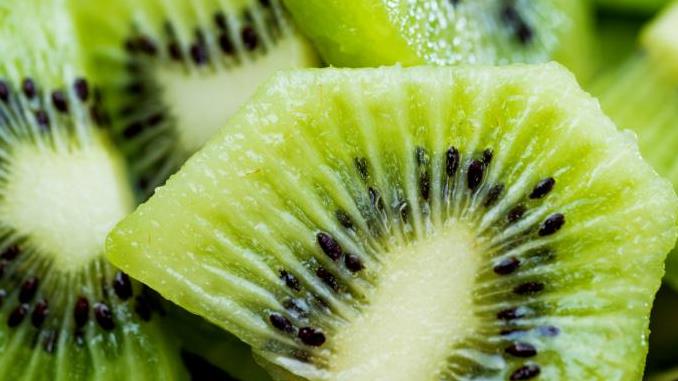Kiwis are universally favored due to their pure sweetness, light fragrance, and unique fiber content. Unfortunately, most people haven’t learned how to store kiwi appropriately. But don’t worry! In this article, we provide you with the lowdown on this issue.
In short, there are 2 simple steps to preserve kiwis:
Step 1: Leave them at room temperature in a dark, cool place.
Step 2: Put them on top of other weighty fruits.
Related: List of fruits from A to Z
Best Ways To Store Kiwi
There is a consensus among food enthusiasts that there is only one best way to store this nutritious fruit, and luckily, it is super simple, including the two following steps.
Step 1: Keep kiwis at room temperature
The very first thing you need to do is keep them at the average room temperature, which ranges from between 68°F to 77°F. This is because such an ideal temperature is conducive to the kiwi’s ripening process.
In addition, the optimal figure for humidity when it comes to preserving kiwis is around 80%. Such a level of moisture prevents the fruits from becoming dehydrated and consequently spoiled.
Preferably, you can keep this tasty fruit inside dark cabinets, pantries, or cupboards. This shields kiwis from direct exposure to harsh ultraviolet light, which can result in their quality deterioration.
Step 2: Put other fruits below
The next crucial step that is often overlooked is rearranging your fruit bowl. You need to put heavier fruits such as oranges, apples, or watermelons beneath kiwis instead of above them. This prevents your tender kiwis from being pressed or crushed, thereby extending their shelflife and preventing any unwanted scars, bruises, or blemishes.
And you may want to keep your kiwis separate from ethylene-producing vegetables, the most common of which are apples, apricots, avocados, bananas, melons, tomatoes, avocados, peaches, pears, or plums. This is because the high ethylene content in these fruits can hasten kiwis’ decomposition.
Can You Refrigerate Kiwi?
It depends on your kiwis’ ripeness, as refrigerating serves to interrupt kiwis’ ripening process and maximize their lifespan.
But if you want to make your kiwis ripen more quickly, this is by no means a good idea. In this case, your kiwis should be kept at room temperature.
How To Store Kiwi After Cutting
Sliced kiwis are trickier to preserve as they are susceptible to moisture loss. Even worse, they may become the breeding ground for germs or bacteria, which can cause them to go off much sooner.
To sort out this problem, you should tightly cover them with plastic food wrap. Doing this can also stop other produces’ smell from altering kiwis’ delicate and sweet flavor.
Alternatively, you can place kiwis in airtight containers or sealable plastic bags as they provide a hygienic environment for your fruit.
Disadvantages Of Freezing Kiwi
Freezing kiwis is a big no-no as it takes a long time for them to thaw. And after they defrost, their texture will become too mushy.
So, if you happened to freeze yours, try incorporating them into fruit salads. Then, its squashy texture may no longer be a big deal as kiwis become a small portion of your dish.
Another drawback is that the fruit can no longer retain its nutritional value. The freezing process, indeed, breaks down the essential fiber, vitamins, and minerals.
How To Ripen Kiwi
It would be best if you can leave kiwis in a pleasantly warm location. This is because a sufficient amount of sunlight facilitates this fruit’s ripening process.
But if you don’t live in a balmy place, consider putting kiwis beside ethylene-producing fruit. As mentioned above, ethylene is responsible for making fruit ripen.
How To Select Fresh Ripe Kiwi
Softness can be used as a proxy for kiwis’ ripeness. So, to check whether yours are underripe or not, press their centers gently. Just like mangos or peaches, unripe kiwis are sturdy and firm to the touch. Meanwhile, ripe ones are delicate and tender.
That being said, you don’t always have to be on the lookout for perfectly ripe kiwis, especially when buying in bulk. Since you can’t eat them all, you need them to stay fresh and tasty for more extended periods. In this case, slightly unripe kiwis should be your go-to option.
When selecting fresh kiwis, you may want to steer clear of those with hideous dark spots or wrinkles. Such visual cues often indicate that those stale kiwis were not cultivated and properly cared for by farmers. Therefore, their taste and nutritional profile may suffer, and they are, without a doubt, not worth your money.
On the contrary, other aesthetic imperfections like shape or size do not reflect kiwis’ quality whatsoever. For this reason, you can purchase misshaped or oversized kiwis with peace of mind.
How To Tell When Kiwi Is Going Bad
The most telltale sign of spoilage is changed texture, so mushy kiwis should be discarded right away.
A less common occurrence is an unpleasant smell. Specifically, ripe kiwis are beautifully fragrant, whereas overripe ones emit either citrusy or syrupy odor.
How Long Will Kiwi Last In The Fridge?
When properly stored, unripe kiwis can maintain their initial taste and juiciness for up to 1 month. Meanwhile, their ripe counterparts only remain edible for ten days. As they approach the end of their lifespan, they start to rot and should be tossed away.
Can I Freeze Kiwi With Skin On?
We strongly advise against freezing an entire kiwi. This is because whole kiwis whose skin is left intact often become overly squishy when you defrost them. This might destroy their original, delightful flavor. Therefore, it would be best if you could peel off your kiwis’ outer skin before putting them in the freezer.
Conclusion
We hope our informative article has helped you know how to store kiwi appropriately. Please share this post with your family and friends, as our content might come in handy to them someday!

